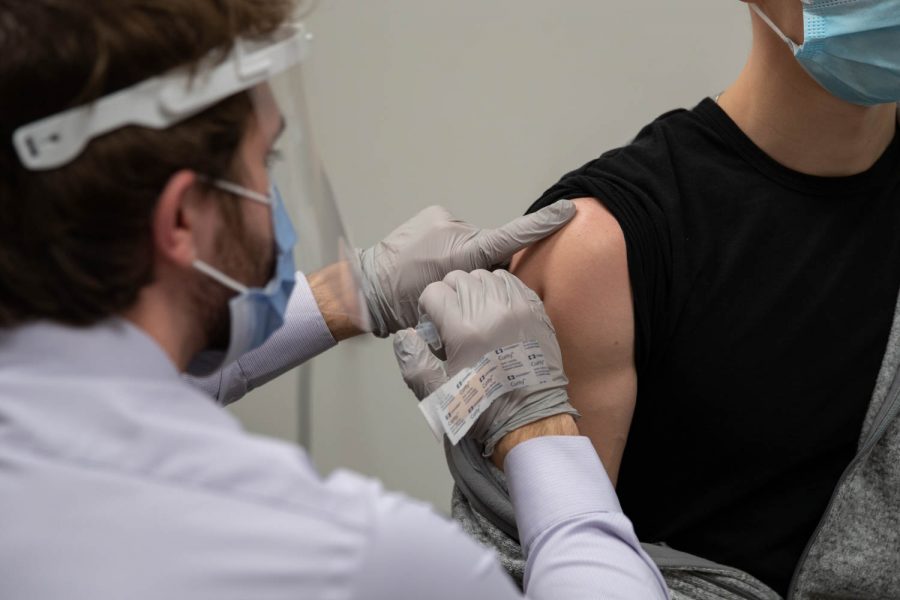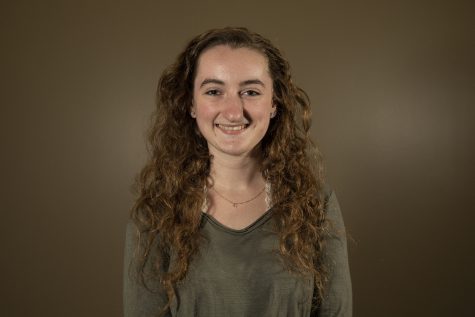University of Iowa students are learning to navigate partially vaccinated social groups
As the vaccine becomes widely available, more and more students are readjusting their quarantine practices to account for the vaccine status of those in their bubble
A student recieves a COVID vaccine on Friday, Jan. 29, 2021 at the UI Medical Education Research Facility.
April 12, 2021
Michelle Oberbroeckling shares a bedroom with her roommate. They come home, remove their masks, and sit together in the same room. Oberbroeckling has not received a COVID-19 vaccine, but several of her roommates have.
Throughout the pandemic, Oberbroekling’s household has had to navigate new boundaries because of the pandemic — who to see, when to wear masks, and what to do when there was a COVID-19 exposure — on top of working through the normal complications that come with living with roommates.
As of Sunday, 1.8 million doses of the COVID-19 vaccine have been administered in Iowa, ranking the state in the middle of the pack when it comes to vaccine distribution. The rise in vaccinations and the expansion of eligibility to the general public has forced some groups of people who live together to readjust their safety practices while some members are fully vaccinated and others are not.
Oberbroeckling, a University of Iowa junior, said she currently spends time with people who aren’t all fully vaccinated. Oberbroeckling, who hasn’t received the COVID-19 vaccine, said her “bubble” — the people she regularly sees — have had different comfort levels when it comes to COVID-19.
“I live with four of my friends, and right now there are two of us that are vaccinated and the other three aren’t,” Oberbroeckling said. “Throughout COVID, some of my roommates were a lot more concerned about COVID than I was, because I feel like if I get it, it’s not the end of the world.”
Oberbroecking added that the people she spends time with have still been cautious throughout the pandemic, but she’s excited for things to loosen up as more places reopen.
UI sophomore Grace Krapfl, one of the members of Oberbroeckling’s “bubble,” said she and her roommates have taken precautions like seeing members of their campus ministry in masks or playing volleyball outside with friends in masks.
Krapfl added that she has been more concerned about getting COVID-19 than some of her roommates but has felt more comfortable now that she’s fully vaccinated.
“It’s been mostly making sure that we stay in communication with each other,” Krapfl said. “And for me, now that I’m vaccinated and another of my roommates is vaccinated and a lot of my immediate family is, I feel a lot more comfortable. I feel more comfortable with people making their own choices, and it’s been nice because it definitely has created at different points different conflict.”
According to guidelines from the Centers for Disease Control and Prevention, two weeks after receiving the last dose of the COVID-19 vaccine people should feel comfortable visiting other fully vaccinated people indoors without masks. However, the CDC still warns that fully immunized people should avoid maskless visits with people who are at high risk for severe COVID-19.
As more social groups with mixed vaccination status try to navigate safety recommendations, Associate Hospital Epidemiologist at University of Iowa Hospitals and Clinics Melanie Wellington said people should consider their mental health while still minimizing risk as much as possible.
“Human beings thrive on social intimacy,” Wellington said. “We’re all hurting because of the lack of it. No question. So, when we were making risk-benefit [assessments], it’s OK to consider the benefit. But you still need to keep that risk as low as possible.”
Wellington added that it’s important for people who are fully vaccinated to continue with safety practices such as wearing masks if they plan to spend time with people who are unvaccinated outside of the small group of people they socialize with.
“For people who are fully immunized who are interacting with anybody outside their own household, this is in the very specific circumstances described by the CDC, they should continue to follow all safety rules,” Wellington said.
She said individuals should still be wearing masks and social distancing, whether they’re at work, in a residence hall, or in a classroom.
“We think that immunization does block transmission but that data is still accumulating,” Wellington said. “So, people who are immunized should not change what they’re doing in terms of safety measures.”
Oberbroecking said everyone she’s close with has done their best to adapt as the pandemic has progressed.
“I’ve been kind of going along with what they’re okay with and making sure we have open communication and that all my roommates are on the same page,” she said. “But I’m definitely comfortable seeing people. For me, as soon as stuff started to open up and we have been more comfortable, it’s been really nice. We’ve all made that adjustment together.”















